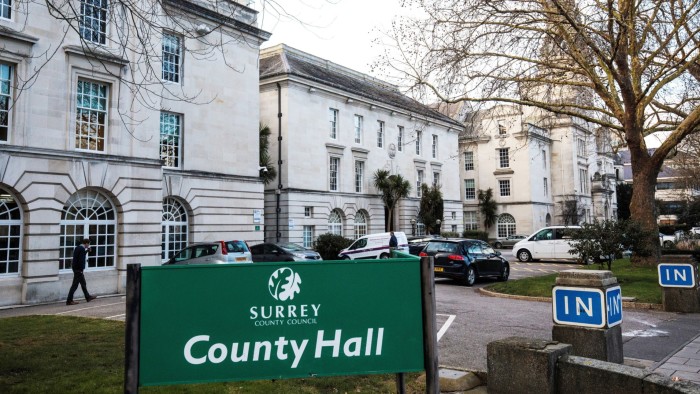Unlock the Editor’s Digest for free
Roula Khalaf, Editor of the FT, selects her favourite stories in this weekly newsletter.
The most wide-ranging overhaul of local government in England in generations is in danger of being derailed by billions of pounds of debt held by insolvent councils, according to local authority officials.
County councils in Surrey — an area that includes the two most indebted local authorities per capita in England — and Essex have requested help from the government in writing debt off as they embark on ambitious restructuring plans.
England’s local authorities had together racked up £77.5bn of debt by the end of 2024 — much of which is held by central government or borrowed from other councils.
Local authorities are facing a parlous financial situation, and many have slashed services or raised council tax, while some, including Birmingham, Nottingham and Croydon, have declared effective bankruptcy.
Writing off the sector’s debt would help councils recover — but would leave taxpayers on the hook for tens of billions of pounds.
In Surrey alone, the 12 local authorities have a combined total debt of £5.5bn, with about £2bn from the town of Woking, according to the county council, and a further £1bn from Spelthorne.
“We will ask the government to write off those debts,” Surrey council leader Tim Oliver wrote in a letter to local government minister Jim McMahon last week, saying that any council reorganisation would need to take this into account to ensure the sustainability of new authorities.
Thurrock in Essex had accumulated debts worth £1.5bn, largely from failed investments in solar energy, when it declared itself bankrupt in 2022. At least £434mn of this is still outstanding.
As it goes through a restructuring, Essex County Council said the government had recognised “it would be a moral hazard to pass debt on to other authorities and wider populations”.
It said it was “critical for local government reform” for the debt issue to be resolved, adding: “We have asked the government for a fair resolution.”
Kevin Bentley, Essex council leader, warned in November that the reorganisation “won’t happen . . . if the government doesn’t write off the debts”.
This is because other parts of the county are reluctant to take on Thurrock’s obligations as the county proceeds with government plans, unveiled last month, for mergers in areas with two tiers of local government.
Under the government’s proposals, lower-tier district councils, such as Woking and Spelthorne — which are in charge of neighbourhood services such as rubbish collection and planning — would merge to create larger unitary authorities of about 500,000 residents.
These would absorb county council roles such as in social care and collaborate to create combined “strategic” authorities covering larger areas able to exercise devolved powers, overseen by a mayor.
At least 12 counties, including Essex and Surrey, have signed up to a fast-track of these mergers that would see new structures in place by 2028.
Jonathan Carr-West, boss of the Local Government Information Unit think-tank, said there were still many issues that needed to be ironed out.
“There is a lot of exploded ordinance which could derail the whole thing,” he said, adding: “Debt is one.”
The danger for government in tackling the issue on an ad hoc basis was that it would prompt an outcry from other regions and councils also in financial distress, he added.
Write-offs in places such as Woking could also disincentivise other cash-strapped councils going through the painful process of balancing the books, in the hope that their debts would also be written off, said Carr-West.
But failing to tackle the overhang in places such as Woking and Thurrock could provoke opposition neighbouring areas, providing ammunition for those who oppose the reforms more broadly.
“Council tax payers living in well-managed authorities will object to absorbing the debts of councils which have run into problems,” said Jeremy Newmark from the District Councils’ Network, which represents lower-tier authorities.
“This risks service cuts or tax increases from the moment these mega councils are created.”
He said the government had “yet to provide clear information” on how it would address the issue.
The Ministry for Housing, Communities and Local Government said there was an “established framework for councils in financial difficulties”.
It added: “We will facilitate local government reorganisation for two-tier areas and for unitary councils where there is evidence of failure, or where their size or boundaries may be hindering their ability to deliver sustainable and high-quality public services.”



